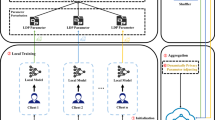Abstract
With the rapid development of distributed machine learning and Internet of things, tons of distributed data created by devices are used for model training and what comes along is the concern of security and privacy. Traditional method of distributed machine learning asks devices to upload their raw data to a server, which may cause the privacy leakage. Federated learning mitigates this problem by sharing each devices’ model parameters only. However, it still has the risk of privacy leakage due to the weak security of model parameters. In this paper, we propose a scheme called privacy enhanced federated averaging (PE-FedAvg) to enhance the security of model parameters. By the way, our scheme achieves the same training effect as Fedavg do at the cost of extra but acceptable time and has better performances on communication and computation cost compared with Paillier based federated averaging. The scheme uses the CKKS homomorphic encryption to encrypt the model parameters, provided by detailed scheme design and security analysis. To verify the effectiveness of the proposed algorithm, extensive experiments are conducted in two real-life datasets, and shows the advantages on aspects of communication and computation. Finally, we discuss the feasibility of deployment on IoT devices.
Access this chapter
Tax calculation will be finalised at checkout
Purchases are for personal use only
Similar content being viewed by others
References
Aono, Y., Hayashi, T., Wang, L., Moriai, S., et al.: Privacy-preserving deep learning via additively homomorphic encryption. IEEE Trans. Inf. Forensic. Secur. 13(5), 1333–1345 (2017)
Benaissa, A., Retiat, B., Cebere, B., Belfedhal, A.E.: Tenseal: a library for encrypted tensor operations using homomorphic encryption. arXiv preprint arXiv:2104.03152 (2021)
Bonawitz, K., et al.: Practical secure aggregation for federated learning on user-held data. arXiv preprint arXiv:1611.04482 (2016)
Bonawitz, K., et al.: Practical secure aggregation for privacy-preserving machine learning. In: proceedings of the 2017 ACM SIGSAC Conference on Computer and Communications Security, pp. 1175–1191 (2017)
Chen, H., Chillotti, I., Song, Y.: Improved bootstrapping for approximate homomorphic encryption. In: Ishai, Y., Rijmen, V. (eds.) EUROCRYPT 2019. LNCS, vol. 11477, pp. 34–54. Springer, Cham (2019). https://doi.org/10.1007/978-3-030-17656-3_2
Cheon, J.H., Han, K., Kim, A., Kim, M., Song, Y.: Bootstrapping for approximate homomorphic encryption. In: Nielsen, J.B., Rijmen, V. (eds.) EUROCRYPT 2018. LNCS, vol. 10820, pp. 360–384. Springer, Cham (2018). https://doi.org/10.1007/978-3-319-78381-9_14
Cheon, J.H., Kim, A., Kim, M., Song, Y.: Homomorphic encryption for arithmetic of approximate numbers. In: Takagi, T., Peyrin, T. (eds.) ASIACRYPT 2017. LNCS, vol. 10624, pp. 409–437. Springer, Cham (2017). https://doi.org/10.1007/978-3-319-70694-8_15
Data61, C.: Python paillier library (2013). https://github.com/data61/python-paillier
Dwork, C.: Differential privacy: a survey of results. In: Agrawal, M., Du, D., Duan, Z., Li, A. (eds.) TAMC 2008. LNCS, vol. 4978, pp. 1–19. Springer, Heidelberg (2008). https://doi.org/10.1007/978-3-540-79228-4_1
Fang, H., Qian, Q.: Privacy preserving machine learning with homomorphic encryption and federated learning. Future Internet 13(4), 94 (2021)
He, C., et al.: FedML: a research library and benchmark for federated machine learning. arXiv preprint arXiv:2007.13518 (2020)
Hitaj, B., Ateniese, G., Perez-Cruz, F.: Deep models under the GAN: information leakage from collaborative deep learning. In: Proceedings of the 2017 ACM SIGSAC conference on computer and communications security, pp. 603–618 (2017)
Konečnỳ, J., McMahan, H.B., Yu, F.X., Richtárik, P., Suresh, A.T., Bacon, D.: Federated learning: strategies for improving communication efficiency. arXiv preprint arXiv:1610.05492 (2016)
Lin, Y., Han, S., Mao, H., Wang, Y., Dally, W.J.: Deep gradient compression: reducing the communication bandwidth for distributed training. arXiv preprint arXiv:1712.01887 (2017)
Ma, J., Naas, S.A., Sigg, S., Lyu, X.: Privacy-preserving federated learning based on multi-key homomorphic encryption. Int. J. Intell. Syst. (2022)
McMahan, B., Moore, E., Ramage, D., Hampson, S., y Arcas, B.A.: Communication-efficient learning of deep networks from decentralized data. In: Artificial intelligence and statistics, pp. 1273–1282. PMLR (2017)
Melis, L., Song, C., De Cristofaro, E., Shmatikov, V.: Exploiting unintended feature leakage in collaborative learning. In: 2019 IEEE Symposium on Security and Privacy (SP), pp. 691–706. IEEE (2019)
Paillier, P.: Public-Key cryptosystems based on composite degree residuosity classes. In: Stern, J. (ed.) EUROCRYPT 1999. LNCS, vol. 1592, pp. 223–238. Springer, Heidelberg (1999). https://doi.org/10.1007/3-540-48910-X_16
Shokri, R., Stronati, M., Song, C., Shmatikov, V.: Membership inference attacks against machine learning models. In: 2017 IEEE Symposium on Security and Privacy (SP). pp. 3–18. IEEE (2017)
Statista. https://www.statista.com/statistics/471264/iot-number-of-connected-devices-worldwide/. Accessed 27 Nov 2016
Tsuzuku, Y., Imachi, H., Akiba, T.: Variance-based gradient compression for efficient distributed deep learning. arXiv preprint arXiv:1802.06058 (2018)
Zhao, J., Chen, Y., Zhang, W.: Differential privacy preservation in deep learning: challenges, opportunities and solutions. IEEE Access 7, 48901–48911 (2019)
Zhu, L., Liu, Z., Han, S.: Deep leakage from gradients. Adv. Neural Inf. Proc. Syst. 32 (2019)
Acknowledgment
This work was supported by the National Key R &D Program of China (2020AAA0107703), the National Natural Science Foundation of China (62132008, 62071222, U20A201092, U20A20176) and the Natural Science Foundation of Jiangsu Province (Grant No.BK20200418).
Author information
Authors and Affiliations
Corresponding author
Editor information
Editors and Affiliations
Rights and permissions
Copyright information
© 2022 The Author(s), under exclusive license to Springer Nature Switzerland AG
About this paper
Cite this paper
Qiu, F., Yang, H., Zhou, L., Ma, C., Fang, L. (2022). Privacy Preserving Federated Learning Using CKKS Homomorphic Encryption. In: Wang, L., Segal, M., Chen, J., Qiu, T. (eds) Wireless Algorithms, Systems, and Applications. WASA 2022. Lecture Notes in Computer Science, vol 13471. Springer, Cham. https://doi.org/10.1007/978-3-031-19208-1_35
Download citation
DOI: https://doi.org/10.1007/978-3-031-19208-1_35
Published:
Publisher Name: Springer, Cham
Print ISBN: 978-3-031-19207-4
Online ISBN: 978-3-031-19208-1
eBook Packages: Computer ScienceComputer Science (R0)




